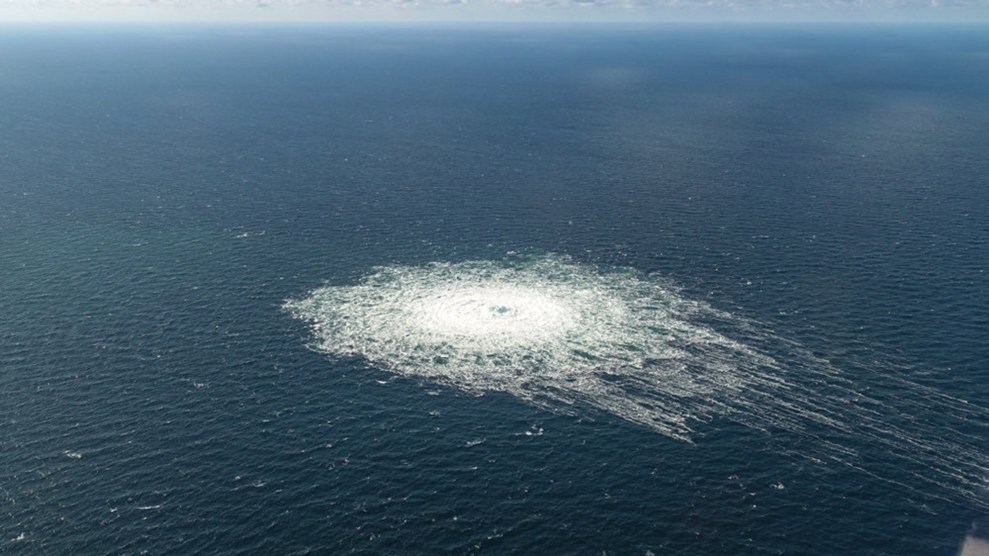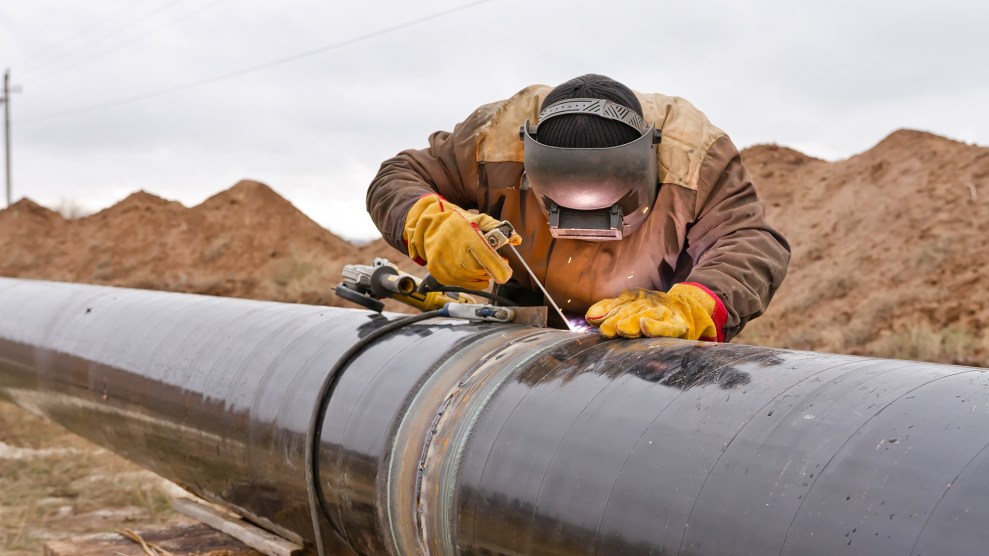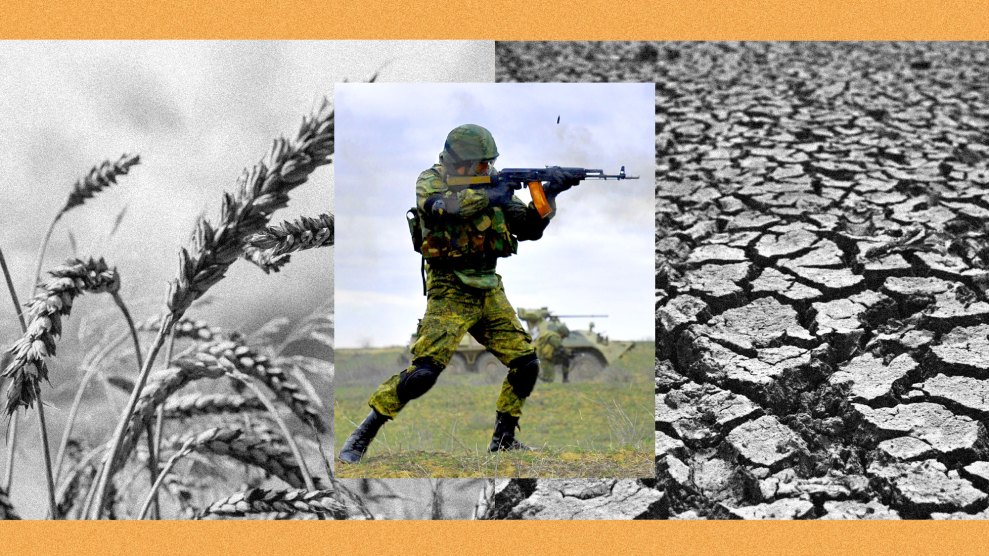
Scientists are now predicting the Nord Stream leak of methane, a potent greenhouse gas, will be the worst in history.Danish Defense Ministry/Xinhua via ZUMA Press
This story was originally published by Slate‘s Future Tense partnership and is reproduced here as part of the Climate Desk collaboration.
On Monday, Danish officials broadcast a warning to ships navigating its nearby waters: There was a massive leak from Nord Stream 2, the Russian-owned pipeline built to transfer natural gas from the former Soviet Union to Germany through the Baltic Sea. That same day, the pipeline’s operators also announced a drop in pressure in its Nord Stream 1 line—which runs parallel with the second line—due to two points of leakage. Neither pipeline was operational at the time, but both had been filled to capacity, with 300 million total cubic meters of gas ready to go just in case. Now, all that fuel is rapidly draining. The photos from the Baltic Sea are stunning.
Se video og fotos af gaslækagerne på Nord Stream 1 og 2-gasledningerne i Østersøen på https://t.co/pj96CN7CDB: https://t.co/7bgt8TljaH #dkforsvar pic.twitter.com/I1zEPaBLYO
— Forsvaret (@forsvaretdk) September 27, 2022
Danish Director of Energy Management Kristoffer Böttzauw soon announced that Nord Stream 2’s puncture was a “really big hole” unleashing a 1-kilometer-long stream of gas bubbles in the water. The damage occurred the same day a Norway-to-Poland gas pipeline meant to exclude Russia was being inaugurated near the Baltic Sea, sparking international speculation, including from the European Union, that Nord Stream was sabotaged. Swedish and German scientists told the Wall Street Journal that they were positive the pipes were hit by “blasts” of a “targeted” nature. Poland’s head of state is convinced this was a symbolic act of aggression by Russia; the Kremlin, for its part, has called such accusations “stupid” and referred to the situation as a “concern.” Right-wingers from all over the world have in turn pointed to February remarks by U.S. President Joe Biden (“If Russia invades … there will be no longer a Nord Stream 2”) to suggest he’s behind this. His administration has said it “stand[s] ready to provide support” to Europe and that a disaster like this is “clearly in no one’s interest.”
The exact reasons for Nord Stream’s plight remain unknown. In the meantime, Europe is mobilizing additional security around its waters and energy sources, while climate officials urge action to halt the gas leakage, an effort Denmark estimates will take over a week. Gas prices in Europe—already high in part because of Russia limiting exports—shot up by 20 percent in response to the news, even though nations like Germany say the leaks do not affect their current gas supplies. (The future looks less certain.) To take stock of the significance of the pipelines, the nature of the harms, and the ramifications, I spoke with Samantha Gross, director of the Energy Security and Climate Initiative at the Brookings Institution and a frequent commentator on European energy issues. Our conversation has been edited and condensed for clarity.
Nitish Pahwa: How would you explain the significance of Nord Stream 1 and 2 to someone unfamiliar with the pipelines?
Samantha Gross: Before the crisis, Russia supplied about 40 percent of Europe’s overall natural gas. Nord Stream 1 was finished in 2011, and its geopolitical impact was to make Ukraine a less important transit country: It lessened the number of Russian exports going through Ukraine as well as the amount of money Russia was paying Ukraine to transit the country and ship gas through it.
Nord Stream 2 is basically a twin to Nord Stream 1, a capacity of gas that Russia could send directly into Germany. The Germans were always in favor of the project. They viewed Russian natural gas as a reliable supply and liked the idea of it coming directly into their country. The United States and other countries in Europe were wary of Russia messing with supplies through Ukraine, knowing the Kremlin had done that in the past, so it felt like the pipeline was more of a geopolitical statement than an energy project. Nord Stream 2 is basically complete, but it never got its last permit from the European Union—the Germans officially pulled their support in the project after Russia’s invasion of Ukraine on Feb. 24.
Nord Stream 2 has never delivered gas, although there was gas in it, probably because it was so close to completion. I think there was just too much operational difficulty to empty it given the circumstances. Nord Stream 1 has been delivering gas for several years, and has even delivered gas off and on during the crisis. Nord Stream 1 has the capacity to transmit about 167 million cubic meters a day, and then Nord Stream 2 would have doubled that capacity.
Nord Stream 1 had been operating at between 10 percent and 20 percent of its capacity, and Russia has played a number of games. In some cases the country has been very straightforward—we are shutting off gas for political reasons, we don’t want to supply gas to Europe—and it’s using gas as a way to try to weaken Europe’s support for Ukraine.
There have also been some games Russia’s been playing where it seems it’s looking for plausible deniability about cutting back supplies to Europe. There have been times when it’s said Nord Stream 1 has maintenance issues or something like, We’re waiting for a compressor that’s coming back from the West, but they won’t send it, when the West has been like, That compressor’s right here waiting for you.
The holes in both pipelines are quite large, so there are assumptions that this could be a deliberate attack.
Sabotage.
How likely do you think that is?
We’ll need to look at the investigations that come from Denmark and Germany and others for accurate reflections of what’s actually going on. It does seem a little crazy for Russia to sabotage its own infrastructure, but if it is looking for more plausible deniability about its cutbacks of gas supply to Europe, this is one way to do it. It has been my base case of thinking that Russia would continue to cut back gas to Europe over this winter. I’m thinking of that as the most likely option—not an outlier, but what I actually expect to happen. And if Russia wants to do that with some degree of semiplausible deniability, sabotaging this infrastructure would be a way to do it. That doesn’t prove they did it—it just means they could have some motive to do it. I would rely on other investigations and not what comes out of Russia, because they’ve been completely dishonest about conditions on the pipeline for a while.
What do you think the geopolitical implications of this might be?
It remains to be seen. In the near term, it’s not much of a different situation than we already expected for this winter when it comes to gas supply. The longer-term question would be future supply through those pipelines and whether, honestly, they ever get repaired. Europe is trying to move away from Russian gas, and they’ll never again view Russia as a reliable supplier—the Kremlin’s supplies of gas are politically motivated and unreliable. And if the pipelines are extensively damaged, they might never get fixed. So, it could change conditions in the future, but I don’t think it changes the immediate future much.
I haven’t seen the size of the methane release there, but I also want to point out that methane is a really potent greenhouse gas—
I was just going to ask about that.
The fact that there’s a serious methane leak in the Baltic Sea is awful from an environmental perspective. So, if it turns out that Russia did this, then frankly, this is not just damaging to a piece of infrastructure—it’s also a climate disaster, and that is really, really unfortunate.
I’m wondering what you think this leak means for the climate this year and in the future, especially as we already face this swirling sea of disasters.
I mean, the world releases a lot of greenhouse gases, so I don’t think this is going to make a tangible difference in the world’s overall efforts to combat global warming, I just think it’s a bad thing that happened. As to how bad, we haven’t really seen those numbers, and the pipelines are still leaking, so we still don’t know what the overall release will end up being.
If this damage is just too vast for any sort of immediate or even long-term repairs, I’m wondering what the implications are, in terms of environmental or international relations, of leaving two extremely damaged and leaky pipelines in the Baltic Sea.
At some point they’re going to do something such that this is no longer an environmental hazard. That’s going to have to happen. I’m not sure how long it will take, but that will get fixed. An ongoing methane leak like that will not be allowed to go, to the extent anybody can do anything about it.
There are concerns all around the world right now about what this winter is going to signify for Europe, as they’re facing high energy prices, not to mention how natural gas is connected to so many heating systems. Gas prices in Europe are now shooting up, I assume as a reaction to further shakeups in the market.
Yeah, or the fear that this means there may be even less gas available for the winter than they thought.
Right. What do you think this could pertain for energy costs and general confidence in gas markets going into the future?
Europe was going to get very little gas supply from Russia for the winter, so it’s been furiously filling up its storage—it’s actually getting close to full. The trick is going to be that Europe generally doesn’t only use stored gas during the winter—it also gets additional ongoing supply, and that’s everything from local European production to liquified natural gas to using fuel switching, like running other kinds of power plants to save the gas for other uses that are more difficult to replace. Like, you could eventually replace your furnace, but distributing electric heat pumps to millions of homes is not going to happen by November, so those homes are still going to rely on gas for heating. Or if you look at certain industries that use natural gas, those are harder to replace.
Will there be enough gas to meet home-heating and also industrial demand? It really depends on the weather: If Europe has an especially cold winter, it’s going to be difficult. And if there are any disruptions in global supply of liquefied natural gas, that’s going to be problematic. Because Europe is sucking in LNG from all over the world and at high prices, this is actually harming other markets in the world—Asia, for instance, which uses a ton of LNG, and its prices are very high as well. Because the LNG market connects gas markets in different parts of the world, you’re seeing this crisis spread. It’s nearly global. The only reason why U.S. natural gas prices haven’t reacted more is because we’re shipping out every molecule of natural gas that we can through our LNG export facilities, and they’re at capacity. We can’t send any more. If we could, the high prices would attract it, and our natural gas prices here would go up more.
Last year, when Texas had those rolling blackouts, it turned out that the natural gas lines, which were not winterized, had frozen over, and people froze to death in their homes. Is there a similar situation in the cards for Europe?
If the winter is especially cold, that is possible. That’s really why you’re seeing European governments work to subsidize natural gas, where they can for consumers, who can’t afford it. I know that people who are really focused on climate issues are probably frustrated by that, but we’re stuck with the energy system we have. We can’t change it on a dime.
The energy crisis this year has led some people to say: “It’s because we’re tamping down fossil fuels that we’re in this situation. Everyone needs to go back to fracking.” The UK just lifted its ban on the practice. I’m wondering what you make of all that.
I think the people who are blaming the current crisis on the energy transition are just wrong. The transition is not moving along fast enough such that renewables are somehow messing up the system that we have. It’s taking us a while to transition. You’ve definitely seen perhaps less investments in fossil fuels than you would have otherwise, but I think the lack of investment in fossil fuels we’ve seen in recent years is really more because of the pandemic than it is because of the energy transition. There are still plenty of fossil fuels in the world, and plenty of people willing to invest in them, and the lack of investment is more the pandemic than it is the energy transition.
And look, the energy transition is ultimately a partial solution to problems like this. If we had more renewable energy and other kinds of non-fossil energy in our system, these problems would be less dire. Geopolitical issues would be less relevant when it comes to global fuels and energy supply. The problem is that we have to feed the system we have today while still thinking about the transition.
If you were an official in Germany working with environmental or climate ministers, what are some of the first steps you might take?
If I were making policy over there right now, the primary words on my lips would be conservation and efficiency. There’s no question—pipeline or no pipeline, accident or no accident—that Europe is facing a real gas crisis this winter, and so I would talk until I was blue in the face about the need to conserve gas this winter, to turn their thermostats down, and why that’s important for every German and every European. It could actually save jobs by allowing some gas to flow to industry and keep the economy afloat. It’s not often that ordinary people’s actions make a huge difference in a big geopolitical crisis, but they do now.
Future Tense is a partnership of Slate, New America, and Arizona State University that examines emerging technologies, public policy, and society.

















